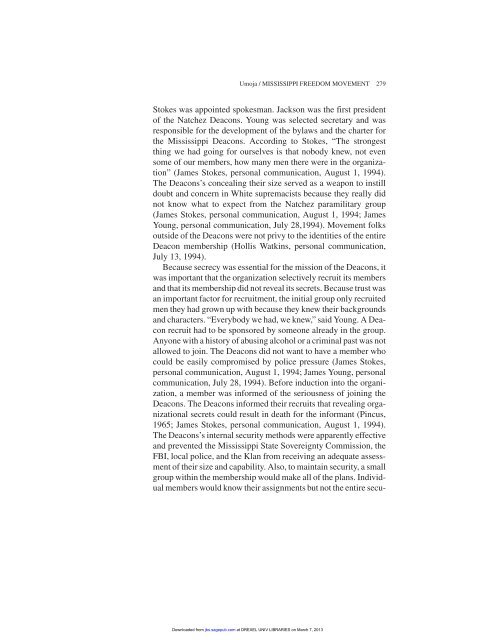MXGM Self-Defence Manual
MXGM Self-Defence Manual
MXGM Self-Defence Manual
You also want an ePaper? Increase the reach of your titles
YUMPU automatically turns print PDFs into web optimized ePapers that Google loves.
Umoja / MISSISSIPPI FREEDOM MOVEMENT 279<br />
Stokes was appointed spokesman. Jackson was the first president<br />
of the Natchez Deacons. Young was selected secretary and was<br />
responsible for the development of the bylaws and the charter for<br />
the Mississippi Deacons. According to Stokes, “The strongest<br />
thing we had going for ourselves is that nobody knew, not even<br />
some of our members, how many men there were in the organization”<br />
(James Stokes, personal communication, August 1, 1994).<br />
The Deacons’s concealing their size served as a weapon to instill<br />
doubt and concern in White supremacists because they really did<br />
not know what to expect from the Natchez paramilitary group<br />
(James Stokes, personal communication, August 1, 1994; James<br />
Young, personal communication, July 28,1994). Movement folks<br />
outside of the Deacons were not privy to the identities of the entire<br />
Deacon membership (Hollis Watkins, personal communication,<br />
July 13, 1994).<br />
Because secrecy was essential for the mission of the Deacons, it<br />
was important that the organization selectively recruit its members<br />
and that its membership did not reveal its secrets. Because trust was<br />
an important factor for recruitment, the initial group only recruited<br />
men they had grown up with because they knew their backgrounds<br />
and characters. “Everybody we had, we knew,” said Young. A Deacon<br />
recruit had to be sponsored by someone already in the group.<br />
Anyone with a history of abusing alcohol or a criminal past was not<br />
allowed to join. The Deacons did not want to have a member who<br />
could be easily compromised by police pressure (James Stokes,<br />
personal communication, August 1, 1994; James Young, personal<br />
communication, July 28, 1994). Before induction into the organization,<br />
a member was informed of the seriousness of joining the<br />
Deacons. The Deacons informed their recruits that revealing organizational<br />
secrets could result in death for the informant (Pincus,<br />
1965; James Stokes, personal communication, August 1, 1994).<br />
The Deacons’s internal security methods were apparently effective<br />
and prevented the Mississippi State Sovereignty Commission, the<br />
FBI, local police, and the Klan from receiving an adequate assessment<br />
of their size and capability. Also, to maintain security, a small<br />
group within the membership would make all of the plans. Individual<br />
members would know their assignments but not the entire secu-<br />
Downloaded from jbs.sagepub.com at DREXEL UNIV LIBRARIES on March 7, 2013


